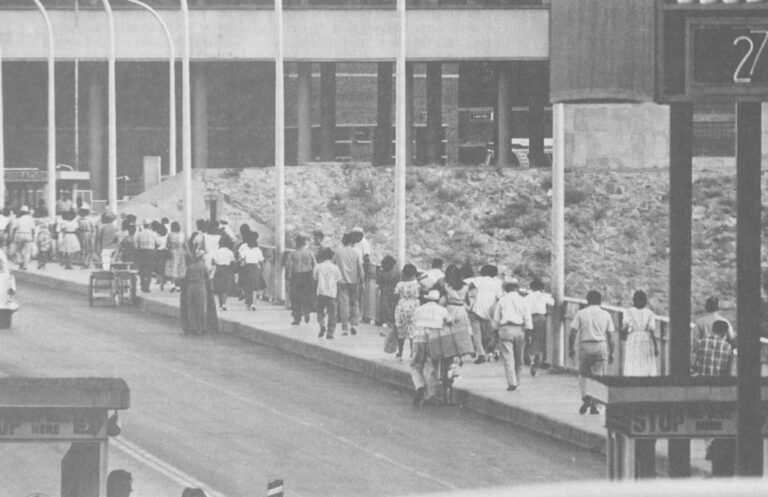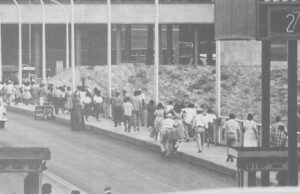A nation which for most of its history has welcomed all comers and which attributes its drive and creativity to the myriad cultures making up its national mosaic now seems to be increasingly drawn to a lifeboat ethic. Yet, there are many reasons why the drift and substance of U.S. immigration policy should be toward openness rather than toward creating a more closed society. Here are a few:
Immigration is a positive rather than a negative phenomenon. Father Allan Figueroa Deck, S. J., a member of the Orange County (Calif.) Task Force on Illegal Aliens, points that immigration is the byproduct of our age’s internationalization and the gradual disappearance of divisions among people who previously had little to do with each other. He states that even in an age of scarcity, immigration is good. It arises out of the mutual needs of both rich and poor nations. The developing nations have difficulty generating enough jobs and the industrial nations generate bottom-level jobs critical to the functioning of society, which cannot be filled with citizens. Thus Western Europe has its “guest workers” from Spain, Italy and other Mediterranean areas. Oil-rich Venezuela has its Colombian illegals. Japan has its Koreans and even Australia and New Zealand have their foreign laborers.
The late Pope Paul VI in his Instruction on the Pastoral Care of Migrants observed that immigration today results from the enormous changes in the sociopolitical order and the processes of industrialization and urbanization occurring worldwide. These changes, the Pope wrote, are leading to a growth in awareness of the fundamental unity of the human race and for the need for the gradual disappearance of territorial borders.Despite the recent bad publicity, immigrants are an asset to the nation. Much has been said about how undocumented workers in particular depress wages, take jobs away from Americans, become a burden on social services and fail to pay their share of taxes. However, a number of important studies (by Wayne Cornelius of the Massachusetts Institute of Technology, North and Houston for the U.S. Labor Department, Villalpando for San Diego County and the Task Force on Illegal Aliens for Orange County) refute these claims. These studies suggest that the immigrant, particularly the illegal alien, is a boon for the nation. Father Deck wrote: “Undocumented workers are the most efficient and productive members of American society. They are the mainstay of the services which hotels and restaurants provide. Undocumented workers are the mainstay of the garment industry in the West Coast and it is their work and only their work, which makes that industry competitive with that of Taiwan or Korea and many other places. And it is the undocumented workers who make possible the continued existence of countless small businesses throughout the Southwest.”
Current immigration-control programs seem destined to fail because they attack symptoms rather than causes, are premised on faulty or inadequate data or have unrealistic expectations. The undocumented workers are pushed northward by an economic crisis in Mexico, (and other Latin nations) and pulled by the habit, felt need or vice of the economic system in the U.S. demanding low-pay labor-a situation which has changed little from the days of slavery to the present use of illegals. Yet, immigration policy zeroes in on alien only-by trying to apprehend him along a 2,000-mile border, which everyone agrees cannot be closed without a prohibitively expensive Berlin-wall type of barrier, or, as the Carter legislative program proposes, deny him employment by assessing civil or criminal penalties against employers. Yet, even if the sanctions against employers could be enforced-an unrealistic expectation given the 100,000 backlog of equal employment opportunity cases and the failure of other agencies to enforce wage and hour laws -such a measure does not solve the basic problem of how marginal industries, hotels and restaurants cannot get by without cheap labor.
Making the border crossing more difficult by doubling the Border Patrol from 2,000 to 4,000 men, as the Carter program proposes, could backfire in a very significant way. A three-year 3tudy of Mexican communities by MIT Professor Wayne Cornelius disclosed that the majority of Mexican workers who come to the U.S. return to Mexico the same year. Making the crossing more difficult may cause them to opt for permanent residency rather than returning after a few months as they have done for generations living out a cultural pattern institutionalized through the Bracero program, an arrangement between the U.S. and Mexican governments which ran from 1942 through 1964 and in its peak year brought 445,000 Mexican workers to the U.S.Current immigration programs and proposed legislation will perpetuate an underclass of workers without an opportunity for upward mobility. The Carter legislation, which would grant conditional amnesty to about 700,000 illegal aliens who entered before 1970 and non-deportable status for five years to several million who came between 1970 and 1977, is meant to prevent such an underclass. But critics say there is no surer way to doom non-deportables to such a class than by decreeing that they cannot bring their families and have to pay taxes without being eligible for social benefits: Medicaid, food stamps, aid to families with dependent children, supplemental security income and perhaps even unemployment insurance or workman’s compensation.
Labor economist Martin Brown writes that the existence of disadvantaged groups-blacks, women, other minorities and now illegal aliens-has made it possible for the U.S. economy to maintain a substantial “low wage sector” exempt from minimum wage regulations, unemployment and workman’s compensation coverage, industrial safety regulations and even labor relations legislation. Racism justifies the low wages and bad working conditions and bars such workers from unions.
But even the lowliest worker eventually finds a way out of such a trap or starts demanding a better deal, thereby becoming an undesirable employee. That is why the illegal alien, who is more vulnerable to exploitation than the citizen worker, finds it so easy to find employment. A priest in the Williamsburg section of Brooklyn which is receiving a steady influx of Mexican immigrants says that within 10 to 15 days the new arrivals have jobs-this in a city with a large number of unemployed minority workers. Legalizing the undocumented would improve the situation for citizen workers.Finally, a more open immigration policy is demanded by our moral principles and by our commitment to human rights throughout the world. As a nation we cannot escape the moral imperative to aid the weak, be they individuals or nations. This is especially true in relation to Mexico, a country from whom the U.S. seized half its territory at the point of a gun in the mid-19th century-including California and its gold, Texas and its oil and Arizona and its rich copper deposits, to say nothing about the riches in Colorado, New Mexico and Nevada. A strong moral argument can be made that the United States has a special responsibility to help Mexico because of such territorial seizure and other economic exploitation.

Opponents of amnesty say that legalizing the undocumented is equivalent to condoning criminality, but both papal teaching and the United Nations Universal Declaration on Human Rights state that the immigrant has a prior right to come. The late Pope Paul stated that the right to immigrate out of need or to escape persecution is based on the very nature of man and precedes the right of nations to establish borders and control and exit and entrance across their borders.
For these reasons, the best course to the immigration problem appears to be 180 degrees from the current direction, which the Carter administration and prevailing public opinion favor. Rather than seeing illegal immigration as an enormous problem, policymakers should see it, suggests the Wall Street Journal, as a “familiar and healthy phenomenon.” Urging that the cheapest and best way to proceed is to legalize the undocumented immigrants, the Journal declared: “The present wave of Western Hemisphere immigration is already enriching and contributing to North American society.”
Rather than spending ever-increasing millions in a futile effort to police the borders, why not invest at least part of that sum in intensive-labor industrialization in Mexico and other nations sending many immigrants. The 1979 fiscal year budget request by the Immigration and Naturalization Service alone totals $298 million. Federal expenditures to improve border control have nearly doubled since fiscal year 1971, according to a report by the Comptroller General of the United States.
Those who fear that the immigrants will keep coming even if the jobs are not available for them need to rekindle their faith in the free market. If it works in others areas, it should certainly work with immigrant labor. Indeed, the out migration of Puerto Ricans to the island during the past few years of declining job opportunities in the cities is evidence that Hispanic immigrants will return home if there are no work opportunities.
Finally, a more open immigration policy will take the racism out of enforcement. There is no reason why Mexican Americans and other brown people should suffer indignities and violations of civil rights simply because of the color of their skin or speech characteristics.
Conversation With Moises Sandoval
Q: The growing Hispanic population seems to be causing problems in so many areas of American life, and yet, Moises, you believe that continued immigration of Spanish speaking people is a positive rather than a negative phenomenon.
A: The “lifeboat” ethic is cowardly and unrealistic; there is no way we can escape participation in the family of nations, no matter how seductive this “lifeboat” idea. I believe the United States should choose to be a participant in the world, should accept special responsibilities… Think about Mexico. We’d go to war to revenge a Marxist government there; and yet we tend to forget about what happens to these people economically.
Q: You sound a bit more passionate on this subject than you did a year ago.
A: I would say that in the course of a year in which I have had the opportunity to explore my own roots and my history I have become more excited on the subject. Yes, perhaps more radicalized. I had set out to took for the success stories among my people . . .
Q: But you’ve long been an agitating journalist?
A: Yes, since the time my brothers and I refused to sit in the “Mexican section” of a movie theater in Colorado and were evicted. I wrote a letter to the local paper protesting the violation of our rights as American citizens. The furor caused by the printing of that letter brought about a change in management at the movie house!
Q: Were you in fact born in Mexico, Moises?
A: I am an American citizen. My family has lived in New Mexico as far as anyone can remember, we say ten generations. Sandoval is the name of a county outside Albuquerque, although I don’t own any of it. I grew up on a farm in northern New Mexico. It was very remote, very rural. We went to a bilingual school because our teacher spoke Spanish. We had no discrimination there. There was no one else but us. We were very poor, but the people were industrious and self-reliant. That culture gave us that. And I understand more Hispanic Ph.D.s have come out of northern New Mexico than anywhere else, despite the poor schools and poorly qualified teachers … I think Hispanics have succeeded wherever their own culture is strong. Where we lose our culture, we become disoriented.
Q: What made your family leave New Mexico and go to Colorado?
A: My father had a small farm and ten kids. We had no high school where we were. Leaving was a way to improve ourselves even though it meant leaving our own fields and going to work in other people’s fields. My father had a relative who was a court reporter and he had visions of one of his children becoming a court stenographer, though he’d only been through the third grade himself. He was a railroad worker when he could get the work. One of my brothers is a Ph.D. chemist, one a college professor, one a specialist in periodontics, one wrestled in the National finals, and so on. Both my sisters have gone to college.
Q: Your family made such remarkable advancement…
A: If I’d stayed in farm work, advancement would have been impossible; I’d still be picking peas. It was luck. And an early life where I was not accustomed to discrimination.
Q: How do you see the future for American Hispanics?
A: Well there is a growing feeling among one section of Hispanic leadership that we should grow closer to Mexico. Some of these people have even met with the Canadian Separatists and with the President of Mexico. They say it is easier for them to arrange a meeting with the President José Portillo than with President Carter! Another section of the leadership of course is seeking broader participation in the American system.
Q: What will you write next?
A: I am going back to Maryknoll Magazine (Maryknoll is a missionary society working almost exclusively in the Third World) but among other things I would like to write a book based on my research from this traveling year. I have talked with many people, from an artist in the barrios to the Governor of New Mexico to an illegal alien to a gang member in East Los Angeles; and I would like to put it all in a book and change the stereotype of Hispanics, showing how these people are not all lazy and unambitious and apolitical. I would like to broaden America’s thinking.
©1978 Moises Sandoval
Moises Sandoval is spending his fellowship year writing about “The Latinization of the U.S.”


